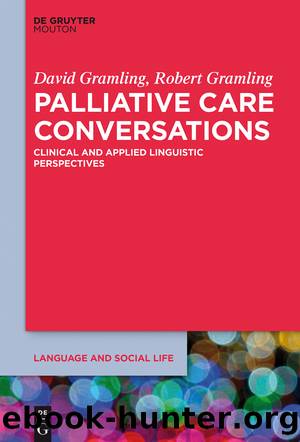Palliative Care Conversations by David Gramling Robert Gramling

Author:David Gramling,, Robert Gramling
Language: eng
Format: epub
Publisher: Walter de Gruyter,
Published: 2019-03-15T00:00:00+00:00
5.3Thatâs the frustrating part right there
Some Palliative Care conversations are openly antagonistic, due in part to patientsâ justified frustrations about how infrastructural and informational deficits in communication between specialties negatively impact them. Clinciansâ patient-centered modes of speaking sometimes exacerbate such frustrations, because they once again prompt patients to perform as the center of responsibility for information management and portrayal. This leads to complaint sequences (Couper-Kuhlen 2012b; Dersley and Wootton 2000; Drew and Holt 1998a; Drew and Walker 2009) and open antagonism (Dersley and Wootton 2000; Heritage 2002; Heritage 2010; see also Goodwin 2006). In this conversation we also encounter features of lay diagnosis (Beach 2001; see also Sarangi 2001) derived from the patientâs long-term involvement in hospital health care systems, customs, and language, compounded by his sense that the clinician is abdicating responsibility for information management. In this instance, we ask:
1) What pre-existing circumstances foment antagonism and discord in Palliative Care conversations?
2) What interactional features in Palliative Care conversations exacerbate pre-existing circumstances of antagonism?
3) What interactional features in Palliative Care conversations help to mitigate pre-existing circumstances of antagonism?
The patient in the following conversation self-identifies as a 45-year-old Black man and as financially insecure, reporting Associateâs-level education and Christian religious affiliation. He has been diagnosed with a stage-four colon cancer. He has âno ideaâ whether he will live for a year, while his clinician-rated survival prognosis at the time of the following consultation is three to six months. In fact, he lived 79 days beyond this consultation, i.e., within the expected clinical prognosis. The patient is unsure whether he prefers comfort over longevity in the treatment of his illness, and he rates his âglobalâ quality-of-life over the previous two days at an eight out of ten. The clinician speaking is a Palliative Care physician.
1 MD: So I mean I just went through Dr. ____âs note when he first met you and-
2 and he had mentioned when he âtalked to you that you were kind of a
3 straightforward âguy (0.5)°That you°(.) really liked people to be pretty-
4 (.) >pretty straight with you and not waste your âtime?< (0.5) Is that
5 accuârate? (0.5)
6 Pt: âYep. (0.5) âcause you canât tell me how long youâre gonna be (0.2) or
7 what weâre gonna âtalk about? (0.5) What âare we talking.
8 MD: >Because it completely depends on âwhat you have to say?< (0.5) âHow
9 can I possibly know? (0.2)
10 Pt: <What will I have to say?> (1.8) All right.
The patient, having long become attuned to the discursive habitus of patient-centered clinical communication, appears uninterested in doing the symbolic labor of representing âhis own perspectiveâ for the clinician, especially after having been flattered with the attribution of straightforwardness. For her part, the physician is holding to the âpatient-centeredâ notion that hearing the state of things from his perspective is the sine qua non of a successful consultation. The patient then does, frustratedly, rehearse what it is that he understands about his current condition (below), but then promptly distances himself from that position. Being prompted to repeat back
Download
This site does not store any files on its server. We only index and link to content provided by other sites. Please contact the content providers to delete copyright contents if any and email us, we'll remove relevant links or contents immediately.
| Administration & Medicine Economics | Allied Health Professions |
| Basic Sciences | Dentistry |
| History | Medical Informatics |
| Medicine | Nursing |
| Pharmacology | Psychology |
| Research | Veterinary Medicine |
Machine Learning at Scale with H2O by Gregory Keys | David Whiting(4296)
Fairy Tale by Stephen King(3372)
Will by Will Smith(2911)
Hooked: A Dark, Contemporary Romance (Never After Series) by Emily McIntire(2551)
Rationality by Steven Pinker(2352)
Friends, Lovers, and the Big Terrible Thing by Matthew Perry(2219)
The Becoming by Nora Roberts(2189)
Love on the Brain by Ali Hazelwood(2062)
A Short History of War by Jeremy Black(1843)
The Strength In Our Scars by Bianca Sparacino(1841)
HBR's 10 Must Reads 2022 by Harvard Business Review(1840)
Leviathan Falls (The Expanse Book 9) by James S. A. Corey(1729)
A Game of Thrones (The Illustrated Edition) by George R. R. Martin(1726)
515945210 by Unknown(1662)
Bewilderment by Richard Powers(1609)
443319537 by Unknown(1546)
The 1619 Project by Unknown(1459)
The Real Anthony Fauci: Bill Gates, Big Pharma, and the Global War on Democracy and Public Health (Childrenâs Health Defense) by Robert F. Kennedy(1406)
All About Love: New Visions by bell hooks(1333)
